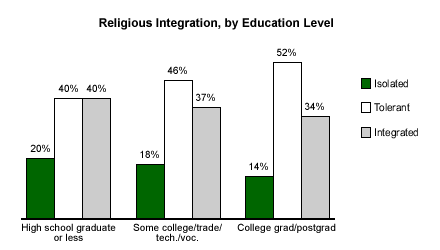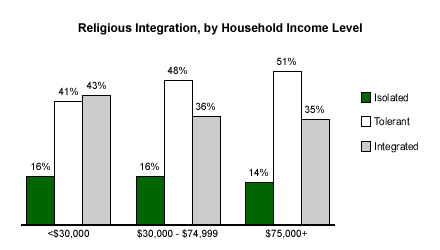This article is the fourth in a series about Gallup's new Religious Tolerance Index.
In previous articles exploring Gallup's new Religious Tolerance Index*, we defined the levels of religious tolerance, looked at the links between those levels and the outcomes of life satisfaction, community service, and spiritual commitment, and examined differences in religious tolerance levels by race and gender. This week, we will continue to drill deeper into the data and look at differences by level of education and income.
Previously, we divided Americans into three levels of religious tolerance according to their responses to the survey. Isolated people are less likely than those who are tolerant and integrated to be members of any particular faith group, but if they are members, they tend to believe that their religion is right or true and all other religions are wrong or false. Tolerant individuals have a "live-and-let-live" attitude toward people of other faiths, and generally feel that they always treat people of different religious faiths with respect.
However, those in the tolerant category are not particularly likely to go out of their way to try to learn more about other religious traditions. Integrated individuals not only tend to be members of faith communities, but they are also engaged in those communities. They go beyond a "live-and-let-live" attitude, actively seeking to learn more from others of different religious traditions.
Education
Surprisingly, levels of religious integration seem to decrease as education levels increase. Forty percent of those with a high school diploma or less are integrated, as opposed to 34% of those with at least a college degree. However, the same is true for those who are in the isolated group. The isolated group represents 20% of those with a high school diploma or less, and 14% of those who are at least college graduates.
A reverse pattern is observed among the "tolerant" group. More than half of people with a college degree or more are tolerant (52%), compared with 40% of those with a high school diploma or less. So although college graduates are less likely than high school graduates to seek out and learn from those of other faiths, they are more likely than high school graduates to adopt a "live-and-let-live" attitude regarding other religions.

Income
Income follows a similar, though less-defined, pattern with regard to those who are integrated. Forty-three percent of those who make less than $30,000 a year fall in the integrated group, leading all other income categories. However, the percentage of those who are isolated remains very similar across income lines, with only a two-point difference. This would seem to suggest that while income level may be related to the more open attitudes that lead to integration, there is no evidence of a relationship with attitudes that encourage isolation.

Bottom Line
Contrary to conventional wisdom, it does not appear that people who are more educated or earn more money are more integrated -- that is, more open to learning about other religious perspectives. In fact, the social conditions that go along with better education and higher income may have the opposite effect. The better educated and more prosperous Americans are, the more limited their exposure to cultural diversity tends to be -- thus making their contact with people of different religious viewpoints less likely.
However, it appears that education may play a counteractive role in making people less likely to be in the isolated group. In other words, education level correlates positively with the likelihood to be tolerant of other faiths, even if they don't actively seek to understand them.
*Results are based on telephone interviews with 1,000 adult members of a church, synagogue, or other religious faith community, aged 18 and older, and 500 non-members, conducted in November and December 2002. For results based on this sample, one can say with 95% confidence that the margin of sampling error is ±2.6%.
